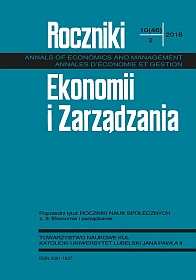The Effects of Government Regulation of Business on the Size of Shadow Economy
Abstract
The problem of shadow economy is relevant to all countries of the world. It is particularly acute for post-socialist countries. They started building the market system in the conditions of current shadow economy with the size of more than 30 % of GDP. By 2015, its share in Poland has decreased from 34.50 % to 19.07 %.
This corresponds to the average level in Europe – 22.77% of GDP. In Ukraine, on the contrary, there was an increase from 38.96 % to 42.90 % of GDP. The task of reducing the shadow economy remains relevant for all countries of the world. In the European Union, Austria (10% of GDP) is the leader in this area.
Based on the foregoing, the purpose of our study is to consider the main factors of the emergence of the shadow economy. Among them it is necessary to determine the nature of the impact of the quality of legal (government) regulation of entrepreneurship on this problem. The analysis of the indicated relationships was carried out using economic and mathematical methods. They allow for reliable, mathematically and economically sound conclusions.
Research results. 1. Since the concept of the shadow economy is rather general and conditional, the article specifies the subject of the study as illegal – illegally concealed from the government regulation entrepreneurship. It occupies the overwhelming part of the hidden economy and is the most sensitive to the impact of legal regulation. 2. For analysis, the World Bank’s “Doing Business” study for 2015 was used. On its basis, four areas of government regulation of business are defined: dealing with construction permits, getting electricity, trading across borders, resolving insolvency that have a significant impact on the size of the hidden business. 3. Based on these results, a comparison was made of the impact of legal regulation of entrepreneurship on reducing its illegal share in Ukraine and Poland. This allowed to identify its disadvantages in Poland and Ukraine and to propose appropriate directions for improvement.
Summarizing the above mentioned, we can conclude that the spheres of legal regulation are factors of illegal entrepreneurship. Improving the effectiveness of such regulation can be the basis for developing a program for deshadowing the economy of any country.
References
Doing Business, World Bank Group, http://www.doingbusiness.org
Fundowicz J., Łapiński K., Peterlik M., Wyżnikiewicz B., Szara strefa w polskiej gospodarce w 2016 roku, Instytut Badań nad Gospodarką Rynkową, Warszawa 2016.
Giovannini E., Carol C., Young A., Korolev A., Measuring the Non-Observed Economy. A Handbook, OECD Publications Service, Paris 2002.
Malyovanyi M., Rolinskyi O., Lysa N., Selected Aspects of the Social Protection System’s Financial Security in the Context of Shadow Economy, “Economic Annals-XXI” 2016, No. 158(3-4)(2), pp. 88-91.
Pauch D., Zjawisko szarej strefy w gospodarce, „Zeszyty Naukowe Uniwersytetu Szczecińskiego. Finanse, Rynki Finansowe, Ubezpieczenia” 1(2015), nr 76, s. 247-255.
Schneider F., Medina L., Shadow Economies Around the World: What Did We Learn Over the Last 20 Years?, “IMF Working Papers” 2018, No. 18/17, pp. 69-76, http://www.imf.org/en/Publications/WP/Issues/2018/01/25/Shadow-Economies-Around-the-World-What-Did-We-Learn-Over-the-Last-20-Years-45583
Schneider F., Williams C., The Shadow Economy, Institute of Economic Affairs, Profile Books Ltd.–Hobbs the Printers, London 2013.
World Economic Situation And Prospects 2018, United Nations, New York 2018.
Гуменюк В.В., Определение причин существования нелегального (теневого) предпринимательства, „Бизнес информ” 7(2015), s. 160-165.
Тенденції Тіньової Економіки В Україні У Січні-Вересні 2017 року, Бюлетень Міністерства економічного розвитку України „Тенденції тіньової економіки в Україні” 2018, http://www.me.gov.ua/Documents/List?lang=uk-UA&id=e384c5a7-6533-4ab6-b56f-50e5243eb15a&tag=TendentsiiTinovoiEkonomikiї.
Copyright (c) 2018 Roczniki Ekonomii i Zarządzania

This work is licensed under a Creative Commons Attribution-NonCommercial-NoDerivatives 4.0 International License.


